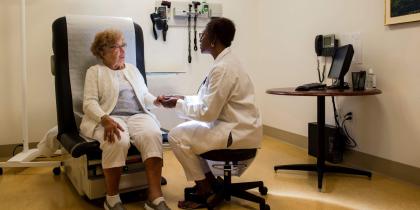GLP-1 Drugs Like Ozempic: What Do Older Adults Need to Know?
Learn about the health benefits and potential risks of these popular diabetes and weight loss medications.

Ozempic, Wegovy, Trulicity, and others in the GLP-1 class of medications have made headlines in recent months, usually for their impressive ability to help people taking them lose weight quickly. Among the most exciting new developments in medicine in recent years, the media seems to highlight a potential new benefit for these drugs every month.
As a geriatrician, I think it’s important to discuss the benefits and risks of these medications for older adults. In this blog post, I’ll assess the GLP-1 hype and share key considerations to keep in mind if you’re thinking about starting one — always in consultation with your doctor — or are already taking one.
What are GLP-1 medications?
GLP-1, or glucagon-like peptide-1, is a hormone produced in the gut that helps lower blood sugar levels by stimulating insulin release and slowing stomach emptying. Drugs that mimic this hormone’s effects were initially developed to treat diabetes, but not surprisingly were also found to promote weight loss.
In 2005, the FDA approved Byetta for type 2 (adult-onset) diabetes, which was quickly followed by others such as Ozempic and Wegovy. More recently, researchers discovered another gut hormone called gastric inhibitory polypeptide, or GIP. When combined with GIP, GLP-1 has an even more powerful effect on diabetes and obesity. This led to the FDA approval of Mounjaro for type 2 diabetes and Zepbound for both type 2 diabetes and obesity, which are dual-action medications that mimic both GIP and GLP-1.
So far, Rybelsus is the only GLP-1 drug available in pill form. The rest are administered by weekly or daily injection and may have a more potent effect on weight loss. However, given their enormous popularity, equally effective oral formulations of these drugs are likely to come to market over the next few years.
Benefits of GLP-1 medications
In addition to the well-documented effects on improving diabetes control and promoting weight loss, there is now substantial evidence that these drugs may improve outcomes for adults with heart disease and slow the progression of kidney disease. According to Harvard Health, some studies on GLP-1 medications for weight loss have seen an average reduction of 10% to 15% in body weight in one year! Since even a 5% to 10% reduction in body weight can bring benefits like improved cholesterol and blood pressure and reduced risk for conditions like obstructive sleep apnea, the impact of this degree of weight loss can be significant.
Additionally, since cardiovascular disease and diabetes are known risk factors for cognitive decline and dementia, there is hope — with some preliminary evidence — that these drugs may have a protective effect against neurodegenerative disorders.
Potential risks for older adults
Given the expanding list of benefits, it is easy to overlook the potentially serious side effects of GLP-1 and dual GLP-1/GIP drugs. Along with reduced appetite come common side effects of nausea and vomiting. Those can be minimized, but not always eliminated, by starting with very low doses and gradually increasing over weeks to months.
Older adults on other medications may be prone to dehydration, low blood sugar, or low blood pressure. These side effects can lead to kidney injury, electrolyte imbalances, and falls. With the increasing availability of these medications via online prescribers, it is important to continue monitoring for side effects with close follow-up from your primary care or specialty provider.
Without proper diet counseling, another risk of rapid weight loss for older adults is the acceleration of sarcopenia, the loss of muscle mass that occurs as we age. After age 30, we lose around 3% to 5% of our muscle mass every decade. Muscle power and performance decline even faster after age 65 for women and age 70 for men. Rapid weight loss without proper diet and exercise can mean not just fat loss, but additional muscle loss — a risk factor for falls and loss of function.
For those already taking glucose-lowering drugs such as insulin and glipizide, ongoing blood glucose checks are essential, and dosage reductions are likely as weight loss occurs.
Rare but serious adverse effects on the pancreas and gallbladder have been reported. If you develop abdominal pain while taking any of these medications, seek medical attention immediately for an evaluation. Dehydration can cause constipation, and bowel obstructions have also been reported. There is also limited data linking GLP-1 drugs to eye issues, including the progression of diabetic retinopathy and optic nerve damage. Remember to keep up with regular ophthalmology visits if you’re on any of these medications!
Older adults take more medications than any other age group. If you have diabetes or hypertension, that number may be even higher. Polypharmacy, or taking multiple medications at the same time, can increase your risk of drug interactions and medication reactions. Make sure to involve your primary care provider in decisions to use GLP-1 and related drugs. They may be the only physician fully aware of the range of drugs you are taking and their potential interactions with each other.
How much do GLP-1 drugs cost?
This revolutionary class of medications often comes with a steep cost, at upwards of one thousand dollars per month for many brand-name agents. Lower prices are available from online compounding pharmacies, but the FDA has raised concerns about reliability and safety. Insurance coverage for GLP-1 drugs has been increasing for those with diabetes and obesity, but coverage for obesity without diabetes is limited at this time.
On-site geriatric primary care at Hebrew SeniorLife
GLP-1 medications can offer significant benefits, but they also come with risks for older adults. A dedicated primary care provider can be a helpful partner in managing your medications and supporting your health.
At Hebrew SeniorLife’s NewBridge on the Charles in Dedham, MA, and Orchard Cove in Canton, MA, residents have access to specialized on-site geriatric primary care practices. Your primary care physician will work with you to maintain your health and well-being based on your personal values, goals, and preferences.
Interested in learning more about our senior living options? Find a service or community online to get started.
Join Our Community: Subscribe to the Hebrew SeniorLife blog for weekly insights on healthy aging and senior living.
Blog Topics
Learn More
The Best Health Care for Seniors
Hebrew SeniorLife is the only senior health care organization affiliated with Harvard Medical School. Members of our caregiving teams specialize in providing geriatric care, and they do so with care and compassion.





